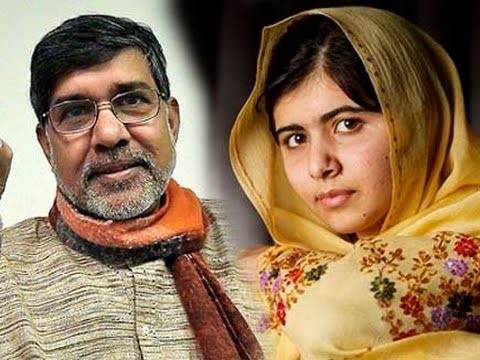NEW DELHI- A day after winning the Nobel Peace Prize along with Malala Yousafzai, Kailash Satyarthi, India's best known face against child labor, today said that he spoke to the Pakistani teenager and told her that they must work for peace between their countries. Malala appreciated this thought, Satyarthi added.
The joint award is more ironically poignant, coming as it does when India and Pakistan are engaged in an intense exchange of ordnance across the contested Line of Control in Jammu and Kashmir and heavily-guarded International Border. Talking to an Indian news agency, Satyarthi said Malala was like his daughter and the duo must continue working for child rights. Malala Yousafzai had on Friday said she is "really happy" on sharing the Nobel Peace Prize with a person from India and both have decided to invite Prime Minister Nawaz Sharif and his Indian counterpart Narendra Modi for the award ceremony in Oslo.
Addressing a press conference late Friday afternoon in Birmingham after the Norwegian Nobel Committee earlier in the day named Malala and Satyarthi the joint winners of this year's peace Nobel, the Pakistani campaigner for girls' education said she and her co-recipient would together work for child rights and education.
“One recipient of the prize is from Pakistan and one is from India. One believes in Hinduism and I strongly believe in Islam. I was greatly
inspired by the work of Kailash Satyarthi,” she said. Announcing the award, the Nobel committee praised the pair's "struggle against the suppression of children and young people". Satyarthi has maintained the tradition of Mahatma Gandhi and headed various forms of peaceful protests, "focusing on the grave exploitation of children for financial gain," the committee said at the Nobel Institute.
The 60-year-old founded Bachpan Bachao Andolan, which campaigns for child rights and an end to human trafficking. The Nobel committee said it was important that a Muslim and a Hindu, a Pakistani and an Indian, had joined in what it called a common struggle for education and against extremism.
Friday, April 19, 2024
We must work for Indo-Pak peace: Kailash Satyarthi to Malala Yousafzai after winning Nobel Peace Prize

9:26 AM | April 19, 2024
8:09 AM | April 19, 2024
Hafiz Naeem takes oath as JI chief, announces anti-government movement
11:39 AM | April 19, 2024
Karachi: AVLC hands over snatched, stolen cars to owners
April 19, 2024
Bid to smuggle Siberian cranes foiled, accused held
April 19, 2024
Tajir Dost app: Traders show lack of interest in registration process
11:09 AM | April 19, 2024
Three abducted people rescued in police operation
April 19, 2024
A Tense Neighbourhood
April 19, 2024
Dubai Underwater
April 19, 2024
X Debate Continues
April 19, 2024
Hepatitis Challenge
April 18, 2024
IMF Predictions
April 18, 2024
Kite tragedy
April 19, 2024
Discipline dilemma
April 19, 2024
Urgent plea
April 19, 2024
Justice denied
April 18, 2024
AI dilemmas unveiled
April 18, 2024
ePaper - Nawaiwaqt
Advertisement
Nawaiwaqt Group | Copyright © 2024





